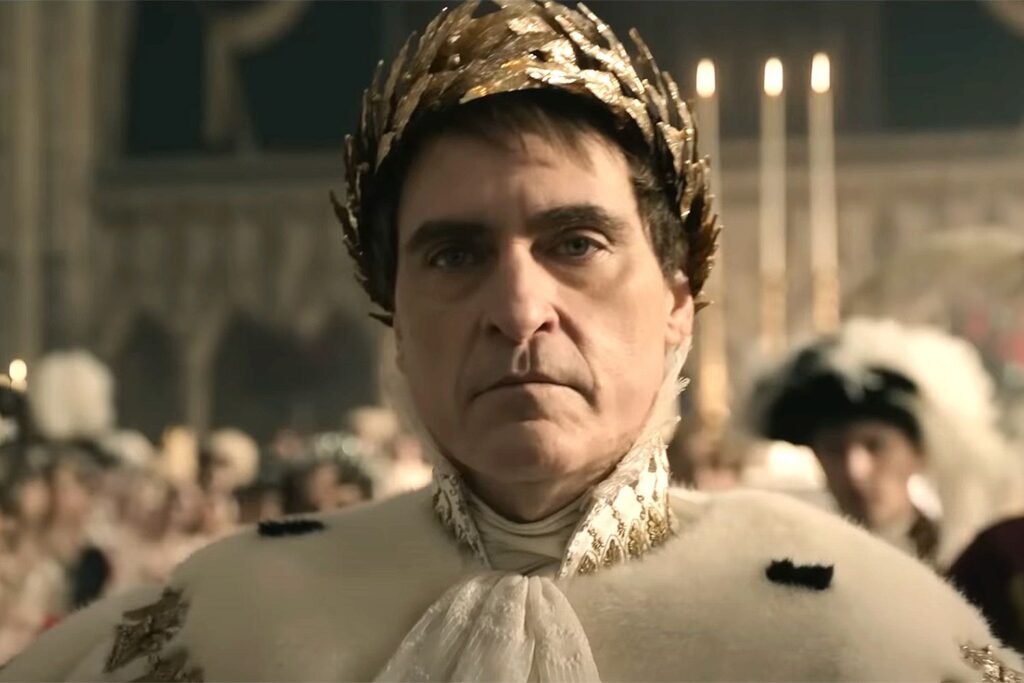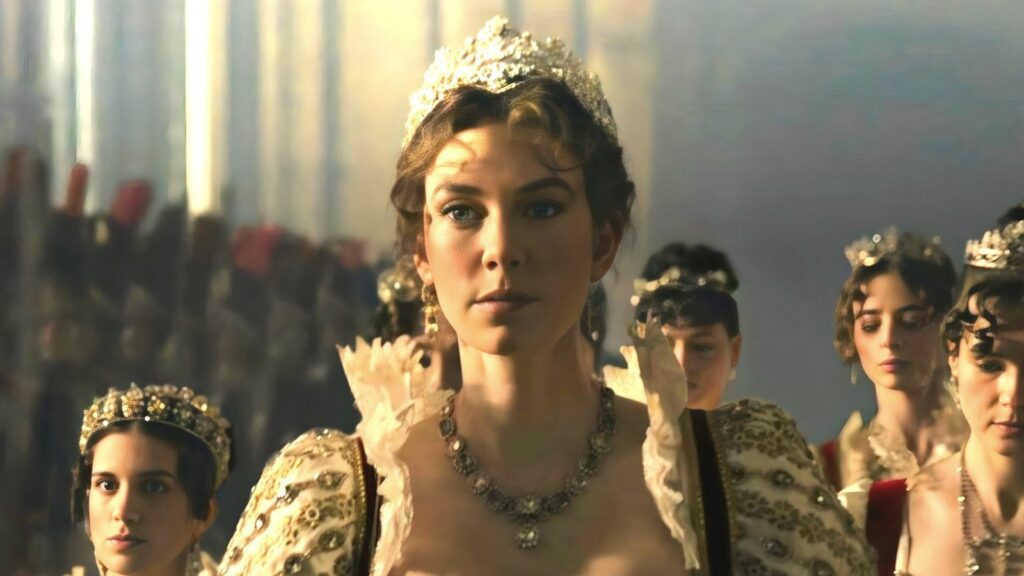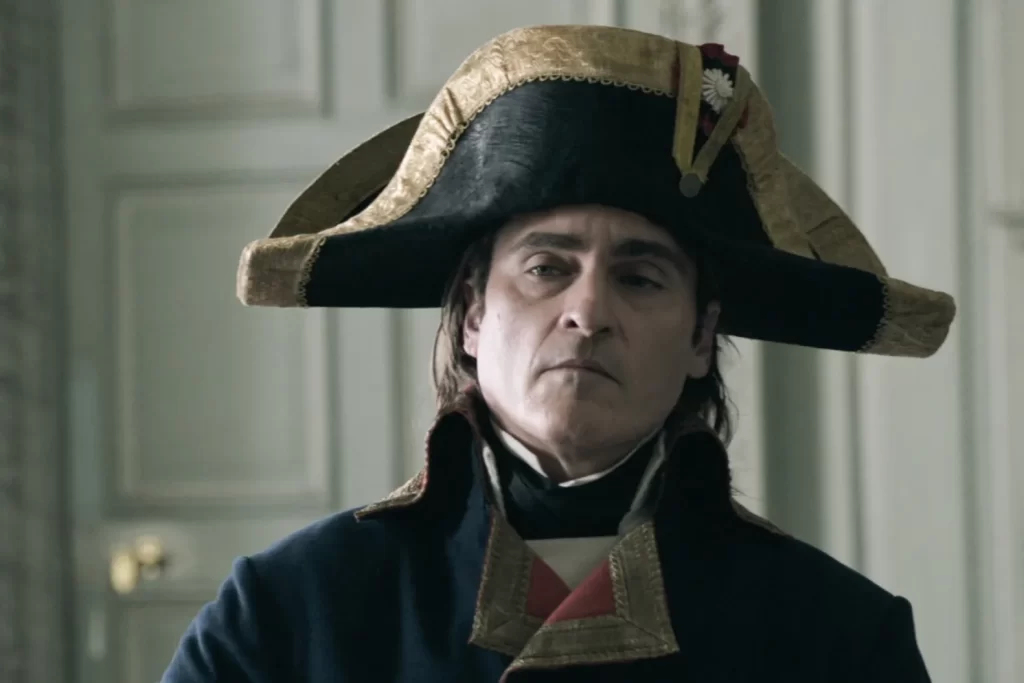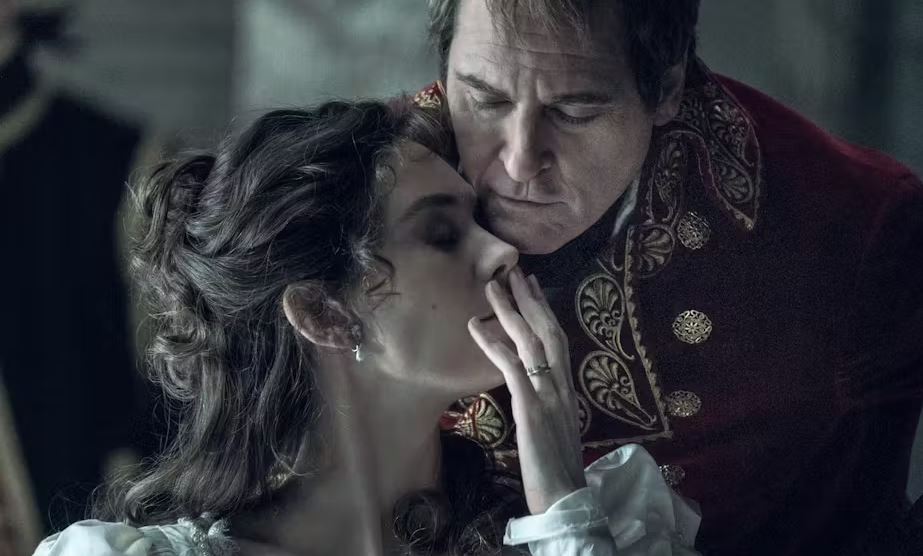
Great-man biopics come with their own prepackaged one-word titles—Oppenheimer, Elvis, Mank—so it isn’t as though Ridley Scott calling his new movie Napoleon demonstrates a criminal lack of imagination. Besides, what were his alternatives? A 1987 miniseries was titled Napoleon and Josephine: A Love Story, but while Napoleon Bonaparte (Joaquin Phoenix) and Joséphine de Beauharnais (Vanessa Kirby) are indeed the two principle characters of this grand, unwieldy epic, they are far from the only figures that have captured Scott’s interest. A more accurate summation of his narrative and thematic concerns might have read, “Napoleon and Josephine and cannons.”
Essentially, Napoleon is two movies in one, and they aren’t so much at war with each other as independent from one another, like separate regiments tasked with fortifying distinct strongholds. As one would anticipate from a Ridley Scott picture, one piece centers on Bonaparte’s military exploits, with large-scale battle sequences and imperial consequences; it’s pretty good, if flawed. Less expected, though perhaps not shocking following the nuanced gender dynamics of Scott’s The Last Duel, is the film’s study of Napoleon and Josephine’s marriage, with all its kinks and complications; it’s pretty good, too. Yet despite its discrete qualities, Napoleon amounts to less than the sum of its pretty-good parts, resulting in an impressive-looking production that’s as predictable as it is entertaining.

Scott and his screenwriter, David Scarpa, have eschewed the Lincoln approach of homing in on a specific period of their subject’s life (recently deployed in Golda), though they at least have the good sense not to waste time depicting his childhood. Instead, the movie begins in 1793, when an unrepentant Marie Antoinette finds her head thrust beneath a guillotine—that the blade is already dripping blood, indicating recent use, is one of the production design’s elegant touches—and proceeds to cover the next quarter-century of Napoleon Bonaparte’s career. Save the timeline gymnastics for Christopher Nolan; Scott moves forward with unapologetic linearity, like a general confidently marching from one milestone to the next.
The inevitability of those milestones—the coup, the crowning, the invasion of Russia, the map ominously labeled Waterloo—lends the picture a historicity that’s slightly deflating. It isn’t as though a movie about Napoleon should avoid these plot points, and perhaps I am simply more interested in learning about the weird scientist who created the atomic bomb than about the short king in the cocked hat. But the sweep of Napoleon’s narrative means that key events are compressed into a Wikipedia-style summary. It doesn’t help that Scarpa’s script struggles to convey crucial information, blurring titles and people (Tahar Rahim is wasted as a courtier) and rendering scenes of ostensible political intrigue far from intriguing.

Thankfully, the movie is also obliged to deliver scenes of martial bombast, which is where Scott’s filmmaking feels most alive. He still tends to favor a gunmetal aesthetic, which may be period-appropriate but which nonetheless dampens his visuals; despite the occasional appearance of the tricolor flag, it’s often challenging to distinguish who’s charging at whom, especially given that all of the soldiers seem to be wearing muddy brown uniforms. That said, there is a musicality to Scott’s staging that’s invigorating. Certain sequences—a down-the-line shot of countless rifles being aimed, fired, and reloaded in harmony; an overhead view of infantry maneuvering into a defensive square to frustrate advancing cavalry; a submerged sight of cannonballs smashing into a frozen lake, staining the waters red—hum with exquisite rhythm, adding filigreed detail to the “cast of thousands!” conceit.
Compared to such majestic carnage, the movie’s portrait of Napoleon and Joséphine’s marriage might have risked appearing trivial, but Scott and his actors flesh it out, imbuing it with syncopated flourishes that render it gratifyingly weird. In form and function, Napoleon operates as a straightforward classical epic, but its central relationship is by turns childish, moving, funny, and even hot. Kirby, who once shaded a figure as glamorous as Princess Margaret with glimmers of desire and dyspepsia, has the skill to make her empress spiky rather than subservient, her eyes routinely flashing anger and annoyance. She also elicits playful work from Phoenix, whose star turn initially feels stiff and suppressed, as though he’s weighed down by his costume; over time he locates his gift for oddness, as when he articulates Napoleon’s constant horniness by flapping his lips like an eager fish. There are the typical jealousies and infidelities—when Joséphine asks Napoleon how she compares to the other women he still sleeps with, he responds, “They cry less, it makes them more attractive”—but there is also a genuine affection that supplies the movie with its slender emotional core.

Perhaps Scott should have devoted more screen time to this ill-fated matrimony and less to the more prosaic elements of Bonaparte’s story: the troop assemblies and mutinies, the geopolitical alliances and betrayals, the famous exiles and returns. To be fair, there are some engaging scenes of Napoleon bantering with rival commanders, when Phoenix plays him as a pompous braggart who blends feigned politeness with swaggering superiority. (Late in the film, after squaring off against a certain fellow from Wellington with the rank of duke (a fine Rupert Everett), Napoleon insists that he can own up to his tactical mistakes before promptly insisting that he’s never personally made one.) Yet the movie’s trajectory can’t help feeling axiomatic, even pro forma, as though Scott is dutifully executing an assignment rather than making a passion project.
Early in the picture, Napoleon’s charging stallion is utterly demolished by artillery fire; after the battle ends, he retrieves the bloody cannonball from the animal’s chest, as though he’s securing a memento from a sporting event. It’s a ghoulish little moment, and while Napoleon doesn’t exactly skimp on such eccentricities, it often seems too large to pay them the proper heed. It’s a largely watchable movie. It is also the opposite of a revolution.
Grade: B-
Jeremy Beck is the editor-in-chief of MovieManifesto. He watches more movies and television than he probably should.
